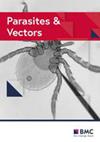入侵蚊子白纹伊蚊(双翅目:库蚊科)在葡萄牙的传播:首次遗传分析
IF 3
2区 医学
Q1 PARASITOLOGY
引用次数: 0
摘要
白纹伊蚊,俗称亚洲虎蚊,已成为最具入侵性的蚊子物种之一。在过去的 50 年里,白纹伊蚊已被引入并在世界各地的热带和温带地区定居。该物种于 1979 年首次在欧洲的阿尔巴尼亚被报道,随后于 1990 年在意大利被报道,目前已在 13 个欧盟(EU)/欧洲经济区(EEA)国家和 337 个地区定居(2023 年)。在葡萄牙,白纹伊蚊于 2017 年首次在阿尔加维和佩纳菲尔地区被发现,随后于 2022 年在阿连特茹、2023 年在里斯本被发现。这种蚊子是登革热、寨卡和基孔肯雅等多种致病病毒的传播媒介,对公共卫生构成重大风险。我们使用细胞色素 c 氧化酶 I(COX)基因测序分析了 2023 年在里斯本采集到的白纹伊蚊,以了解它们之间的遗传关系。我们的数据表明,2023 年在里斯本三个地点检测到的白纹伊蚊种群与近期但截然不同的引入事件相对应。虽然迄今为止葡萄牙本土还没有发生伊蚊传播病毒的本地传播,但蚊子的传播和国际旅行的增加增加了伊蚊传播疾病爆发的风险。白纹伊蚊在葡萄牙的持续传播以及在新地点的多次传入都提高了人们对监测蚊媒以控制和预防伊蚊传播疾病爆发的必要性的认识。本文章由计算机程序翻译,如有差异,请以英文原文为准。
The spread of the invasive mosquito Aedes albopictus (Diptera: Culicidae) in Portugal: a first genetic analysis
Aedes albopictus, commonly known as the Asian tiger mosquito, has become one of the most invasive mosquito species. Over the last 5 decades, it has been introduced and established in various tropical and temperate regions worldwide. First reported in Europe in 1979 in Albania and later in Italy in 1990, the species is now established in 13 European Union (EU)/European Economic Area (EEA) countries and 337 regions (2023). In Portugal, Ae. albopictus was first detected in the Algarve and Penafiel regions in 2017, followed by Alentejo in 2022 and Lisbon in 2023. This mosquito species poses a significant public health risk as a vector for numerous pathogenic viruses, including dengue, Zika, and chikungunya. Aedes albopictus collected in Lisbon in 2023 were analyzed using cytochrome c oxidase I (COX) gene sequencing to understand their genetic relationships. Our data indicate that the Ae. albopictus mosquito populations detected in three locations in Lisbon in 2023 correspond to recent but distinct introduction events. Although there has been no local transmission of Aedes-transmitted viruses in mainland Portugal to date, the spread of the mosquito and increased international travel increase the risk of Aedes-borne disease outbreaks. The ongoing spread of Ae. albopictus in the country and the confirmed multiple introductions in new locations raise awareness of the need to monitor mosquito vectors to control and prevent autochthonous Aedes-borne disease outbreaks.
求助全文
通过发布文献求助,成功后即可免费获取论文全文。
去求助
来源期刊

Parasites & Vectors
医学-寄生虫学
CiteScore
6.30
自引率
9.40%
发文量
433
审稿时长
1.4 months
期刊介绍:
Parasites & Vectors is an open access, peer-reviewed online journal dealing with the biology of parasites, parasitic diseases, intermediate hosts, vectors and vector-borne pathogens. Manuscripts published in this journal will be available to all worldwide, with no barriers to access, immediately following acceptance. However, authors retain the copyright of their material and may use it, or distribute it, as they wish.
Manuscripts on all aspects of the basic and applied biology of parasites, intermediate hosts, vectors and vector-borne pathogens will be considered. In addition to the traditional and well-established areas of science in these fields, we also aim to provide a vehicle for publication of the rapidly developing resources and technology in parasite, intermediate host and vector genomics and their impacts on biological research. We are able to publish large datasets and extensive results, frequently associated with genomic and post-genomic technologies, which are not readily accommodated in traditional journals. Manuscripts addressing broader issues, for example economics, social sciences and global climate change in relation to parasites, vectors and disease control, are also welcomed.
 求助内容:
求助内容: 应助结果提醒方式:
应助结果提醒方式:


